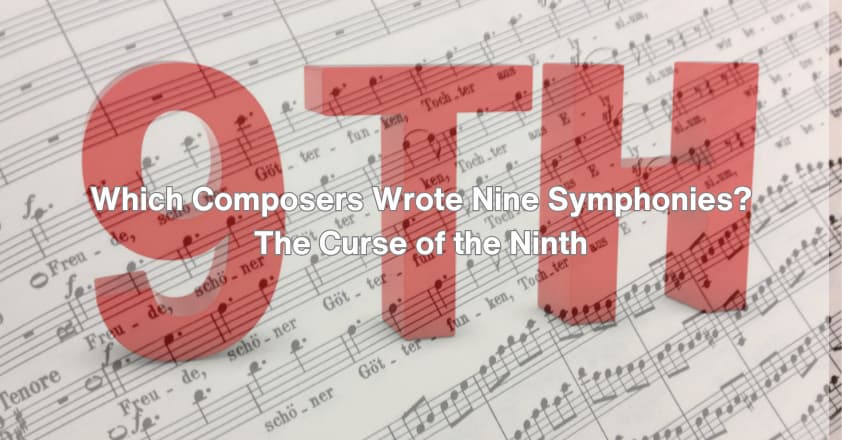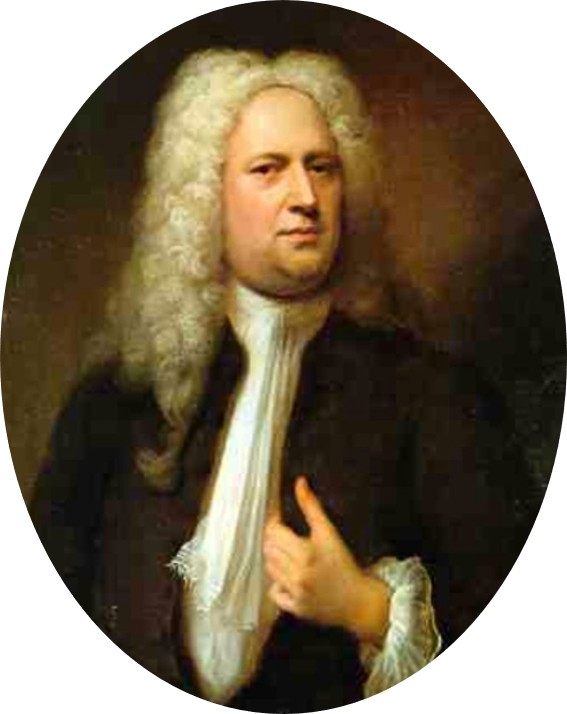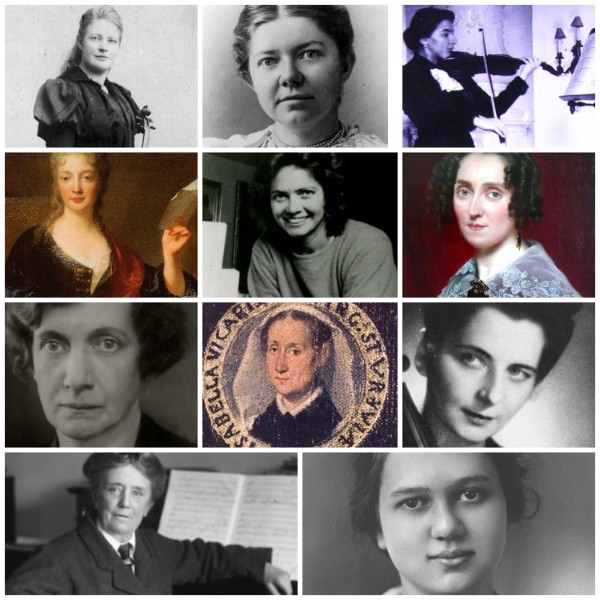“The curse of the ninth” is an eerie quirk of classical music history. The phrase refers to a superstition that a composer will die after writing his ninth symphony.
The superstition sounds silly, but the fact remains that a good chunk of the most famous symphonists did indeed pass away after writing their ninth symphonies.
Today, we’re looking at ten composers who only wrote nine symphonies, as well as what those final ninth symphonies are like.

Ludwig van Beethoven (died 1827)
Beethoven 9 – Chicago Symphony Orchestra – Riccardo Muti
Beethoven was the first major composer who died after composing his ninth symphony. (That’s the symphony for orchestra and chorus that includes the Ode to Joy.)
Beethoven’s ninth symphony was premiered in May 1824. By this time, Beethoven was completely deaf, and contralto soloist Caroline Unger had to turn Beethoven around onstage so that he could see the cheers of the audience.
It is easy to think of Beethoven’s ninth symphony as his great goodbye to the symphonic form. But it was never meant to be. In fact, Beethoven actually began a tenth symphony, but only snippets of it survive today. In 2019, a group of Beethoven fans used AI to extrapolate out from those sketches to mixed results.
Beethoven died in 1827, and his tenth symphony died with him.
Franz Schubert (died 1828)
Schubert: Symphony No. 9 C major – John Eliot Gardiner – Wiener Philharmoniker
After Beethoven, Schubert became the next major composer to die after writing his ninth symphony.
Schubert composed his ninth symphony (nicknamed the “Great”) between 1824 and 1826. He sent it to the music organization Gesellschaft der Musikfreunde (Society of Friends of Music), which had a group of amateurs read through the piece. But it never received a professional performance during his lifetime.
In November 1828, Schubert died, possibly of typhus or an unknown illness. (The oft-repeated belief that Schubert was killed by syphilis has never been proven.)
Schubert’s ninth symphony was only premiered in 1839 and published in 1849.
Anton Bruckner (died 1896)
Bruckner: 9. Sinfonie – hr-Sinfonieorchester – Stanisław Skrowaczewski
Those who want to consider Bruckner a member of the club of “composers who died after writing nine symphonies” are on shaky ground, as he actually wrote eleven symphonies in all.
An early student work from 1863, known today as Bruckner’s Symphony in F, was ultimately disowned by the composer.
Later, in 1869, he wrote another symphony, this one in D-minor. However, Bruckner was devastated by its criticism and withdrew that one, too. That work has since become known as “Symphony No. 0.”
Bruckner’s final symphony, which was his eleventh officially but ninth by his numbering system, preoccupied him for the last decade of his life. He began work on it in 1887 and had not completely finished the final movement by 1896.
Bruckner apparently conceived of this work as his final piece of music. It is said that he told his doctor, “And now I dedicate my last work to the majesty of all the majesties, the beloved God, and hope that he will give me so much time to complete the same.”
Antonín Dvořák (died 1904)
Dvořák: 9. Sinfonie (»Aus der Neuen Welt«) – hr-Sinfonieorchester – Andrés Orozco-Estrada
Like Bruckner, Dvořák is a member of this club but with an asterisk, as nearly half of his symphonies were lost or suppressed during his lifetime, so it’s tough to say which ones might count toward the so-called curse. (The various stories surrounding the loss or suppression of those early symphonies are interesting, to say the least.)
However, when you add up all of the symphonies, Dvořák did indeed write nine. His last – nicknamed “From the New World” – was premiered in New York City in 1893, and it became his most famous.
Happily, his ninth symphony didn’t signal Dvořák’s death of his creative life. Even though he never wrote another symphony, after 1893 Dvořák wrote four more operas, five symphonic poems, and other works.
Dvořák died in 1904.
Gustav Mahler (died 1911)
Mahler: Symphony no. 9 – Vienna Philharmonic Orchestra – Leonard Bernstein
Gustav Mahler was actually the first composer to worry about the “curse.”
He was so concerned about it that after his massive eighth symphony, he wrote a symphony-like song cycle that he called Das Lied von der Erde. He then continued writing his ninth symphony, relieved that he had outwitted the curse.
However, Mahler died while writing his Symphony No. 10. Only the first movement of that work was near completion upon his death.
Alexander Glazunov (died 1936)
Alexander Glazunov: Symphony No.9 in D minor “Unfinished”
Mahler was not the last composer to brush against the “curse.” Russian composer Alexander Glazunov began his ninth and final symphony in 1910, but all he left behind was a piano sketch for the first movement. Composer and conductor Gavriil Yakovlevich Yudin later orchestrated it.
Ralph Vaughan Williams (died 1958)
Vaughan Williams: 9th Symphony
Between 1910 and 1957, British composer Ralph Vaughan Williams wrote nine symphonies. His final symphony was composed between 1956 and 1957, and was premiered in April 1958.
At that premiere, Vaughan Williams was eighty-five years old. He died soon after the premiere of his Ninth, in August 1958.
Roger Sessions (died 1985)
Roger Sessions: Symphony No 9 (1978)
American composer Roger Sessions began writing his ninth symphony in 1975 after being commissioned by the Syracuse Symphony Orchestra. It was finished three years later and premiered in 1980.
The work takes inspiration from Romantic Era poet William Blake’s poem “The Tyger.”
Sessions died five years after the premiere of his ninth symphony. He was in his late eighties at the time.
Alfred Schnittke (died 1998)
Alfred Schnittke: Symphony No.9 – Alexander Raskatov
Composer Alfred Schnittke had a series of strokes toward the end of his life, leaving him unable to write out music legibly.
When he wrote his ninth symphony in 1996, he did his best on his own to write out a legible manuscript, then had conductor Gennady Rozhdestvensky make a fair copy that could actually be used for performances.
Unfortunately, Schnittke was disappointed in that transcription, but he died in 1998 before he could oversee a fix. His widow hired two other composers to take on the task.
The ninth symphony was finally premiered in 2007, almost a decade after Schnittke’s death.
Malcolm Arnold (died 2006)
Malcolm Arnold: Symphony No. 9
British composer Malcolm Arnold finished his ninth symphony in 1986.
Over the previous seven years, the Court of Protection had jurisdiction over his affairs, given his alcoholism and poor mental health.
He was told in the early 1980s that he only had a year left to live. But he began working with a caregiver and survived another two whole decades! He dedicated his ninth symphony to that caregiver.
The first public performance of his Ninth Symphony was given in 1992.
Conclusion
“The curse of the ninth” is definitely a spooky quirk of classical music history, and, at least in Mahler’s case, it impacted important creative choices.
However, it should be noted that many major composers survived writing their ninth symphonies. Dmitri Shostakovich, for instance, wrote fifteen. Going back further in time, Wolfgang Amadeus Mozart wrote over forty, and Joseph Haydn wrote over double that.
Also, as symphonies grew larger in scope after Beethoven, it makes sense that fewer and fewer composers would be able to write over ten symphonies over the course of their lifetimes.
That said, the idea of the “curse of the ninth” is unlikely to die any time soon, and the careers of the preceding ten composers explain why!
For more of the best in classical music, sign up for our E-Newsletter



Excellent research! There is an episode of “Midsomer Murders” that features the curse of the Ninth. I’m sure that it is widely available, and it is quite entertaining. Simon Callow is in the cast (playing the viola, as I remember), and he becomes a victim. Worth a look-see.